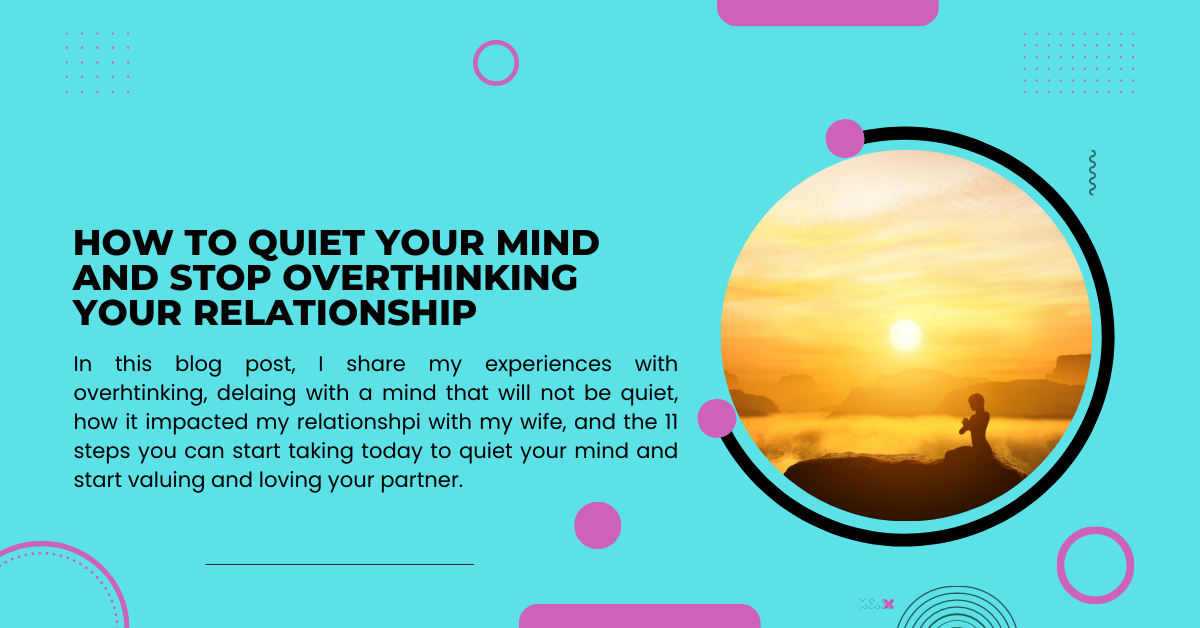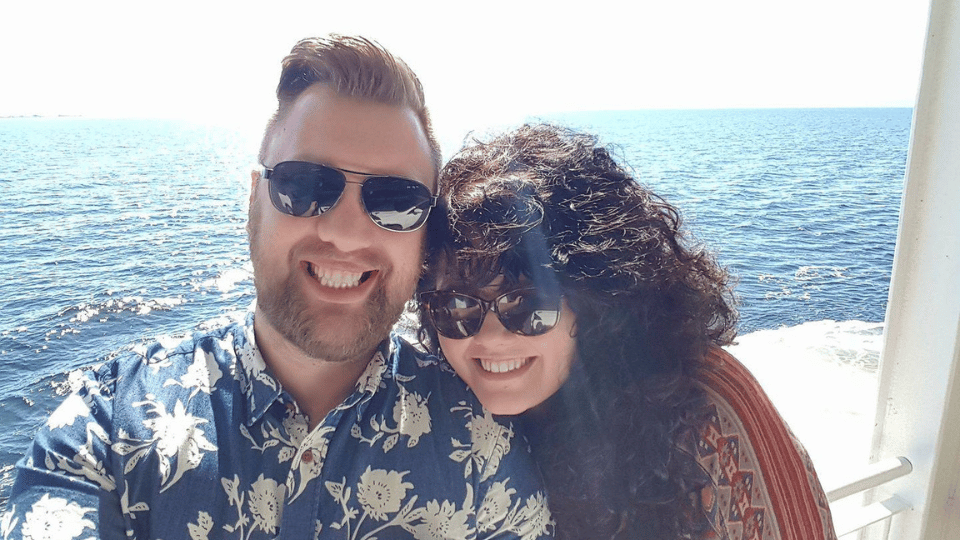Introduction
For the longest time, if you had asked me “Ryan, how do get a quiet mind,” I wouldn’t have had an answer for you.
Honestly, even to this day, I am always thinking. My brain is always moving. Sometimes it’s hard to sleep because I feel like I cannot shut off my stupid brain.
I guarantee you I am the world’s BEST OVERTHINKER!
Where’s my trophy?

This is what I imagine my “World’s Best Overthinker” trophy would look like.
Want proof? It took me a week and a half to create an outline for this blog. I kept thinking and obsessing about what I was going to write about and how it was going to come off.
Am I going to sound like an idiot?
Are people going to care?
How do I talk about overthinking and a quiet mind in a remotely interesting way?
Am I still hungry after eating all those leftovers from last night (yes, I just thoughts this while I was writing).
Anxiety makes a quiet mind almost impossible and a noisy mind drives anxiety.
It’s an incredibly vicious cycle that can cause real harm to you and the people around you.
Relationships suffer, sometimes immeasurably, when you don’t learn to have a quiet mind and exist in the present moment.
Obsessing never got us anywhere.
Thinking might FEEL like doing…but at the end of the day, if no action is taken, you’re just thinking.
My wife Stephanie, on the other hand, is a classic, decisive, confident and focused woman.
She rarely, if ever, overthinks anything.
Want proof?
Last night while watering flowers she saw something rustling in the forest park behind our house.
Curious, she dropped the hose and ventured out into the dark to see what it was.
That’s right, I said IN THE DARK!
She didn’t know if it was a cat or a cougar (we have lots of cougar sightings where we live).
That didn’t stop her curiosity from pushing her to go find out what it was.
Fortunately, it was the neighbour’s very fluffy orange tabby. Harmless.
Steph had no fear of venturing out to see what it was (I often tease her that her self-preservation instinct is virtually non-existent…I think I’ve been proven right).
This might be an extreme example of not overthinking, but it highlights my point: when you take action instead of just thinking, that’s when life happens.
We got a very funny story out of this while sitting at our fire table on our back patio.
We laughed ourselves silly. It’s a great story that we can tell friends and family (and that I’m now able to tell you).
Overthinking is a momentum killer, especially in healthy relationships.
It can stop your progression in its tracks and cause unintended damage and unforeseen consequences.
In this article, I will cover exactly how to develop a quiet mind, stop overthinking, and start valuing your relationship with your partner.
Table of Contents
Signs of Overthinking in Your Relationship
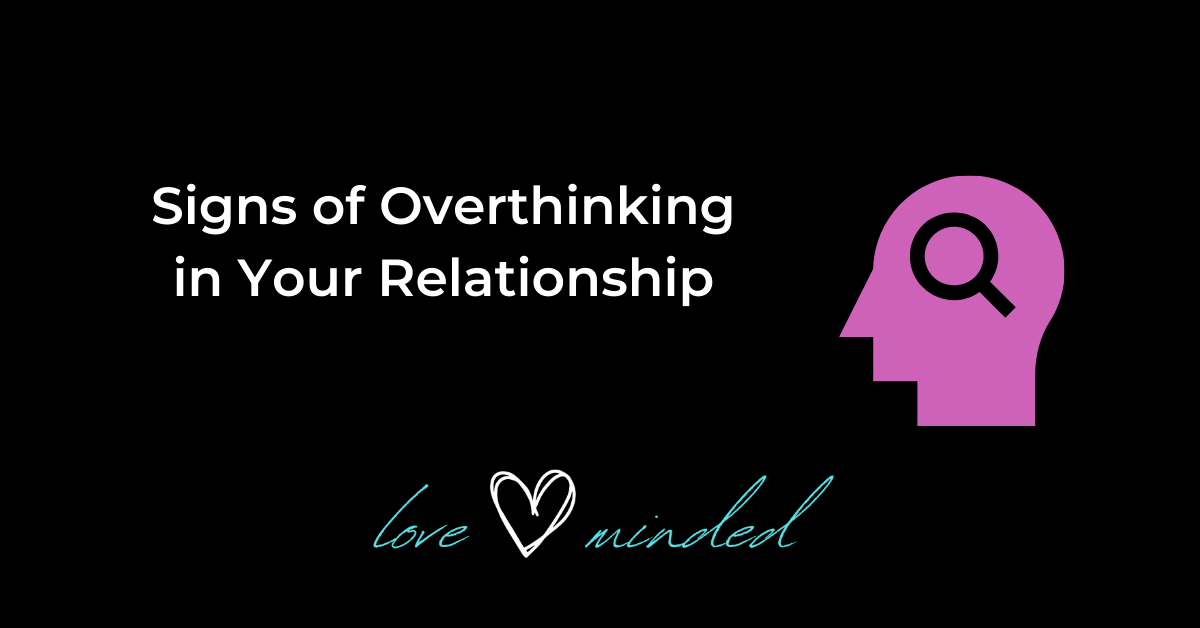
“But Ryan,” you ask “EVERYONE overthinks! It’s part of being human. How do you develop a quiet mind when it is supposed to think and is evolutionarily designed to react and process in order to keep you safe? It’s not possible!”
You’re not wrong, my friend!
Overthinking is a part of our evolutionary advantage. We get to rationalize, consider, analyze, and study.
Nobody ever criticized Thomas Edison or Albert Einstein for overthinking, I’m sure (and if they did, it likely just fueled them toward proving their doubters wrong).
You’re likely not an inventor of a noble-winning scientist about to change the nature of thought with a single equation.
You’re a human being trying to navigate the challenges and struggles of daily life.
You don’t need Edison’s or Einstein level’s of thought to navigate daily relationship decisions and pitfalls.
You need to understand what’s important to you, to live the life you want to live, and how to make your partner happy.
The first step to a quiet mind and halting the overthinking train is to realize that you have unhelpful thinking patterns.
You might not even realize that you fall into these patterns on an almost daily basis, but believe men, when you slip into overthinking about things you are walking down a well tread path.
What are those patterns and how have they solidified themselves into your life?
A good example was my decision not to run for re-election to a position on a local board of education.
I had agonized over this for a year before I finally made the decision.
It was eating me up inside.
Would I win?
Would I lose?
How would I feel if I invested untold hours and political capital in trying to get re-elected, only to be defeated?
Would anyone campaign against me or attack me?
How would I deal with attacks?
When should I announce it?
What will I campaign on?
If I don’t run, what will my legacy be?
I was asking these things to myself for a year before I even considered the most important question: am I happy and is this position serving me and my family?
When I finally asked myself this question, in no small part to Stephanie having enough notes spent agonizing over the decision, the answer was obvious: I’m miserable, this is taking a toll on my physical and mental health, and I don’t want to do this anymore.
I’ll be honest, I didn’t know how this decision was going to affect me.
I was TERRIFIED that I was making the wrong decision.
But the strongest feeling I had was RELIEF.
This relief quieted my mind.
Everything cleared and a felt completely at peace.
I knew then and there that this was the right decision (if only I had made it a year early, I could have spared myself and Steph hours and hours of unending anxiety. Lesson learned…hopefully).
You see, overthinking can have a significant effect on communication and trust between you and your partner.
For a year when I was seesawing this decision, I talked less to Stephanie.
I felt like I was being less honest with her about my feelings and the stress I was under.
I felt that if she knew I was eating myself up inside about this that she would worry, and I didn’t want her to.
This was exactly the wrong thing to do, though. I should have opened up to her sooner about my concerns.
She could have helped me navigate through it and find a pathway toward my best outcome more quickly.
Communication and trust are paramount in healthy relationships, and overthinking and a noisy mind can affect those vital lines of connection between you and your partner.
Why Do We Overthink in a Relationship?
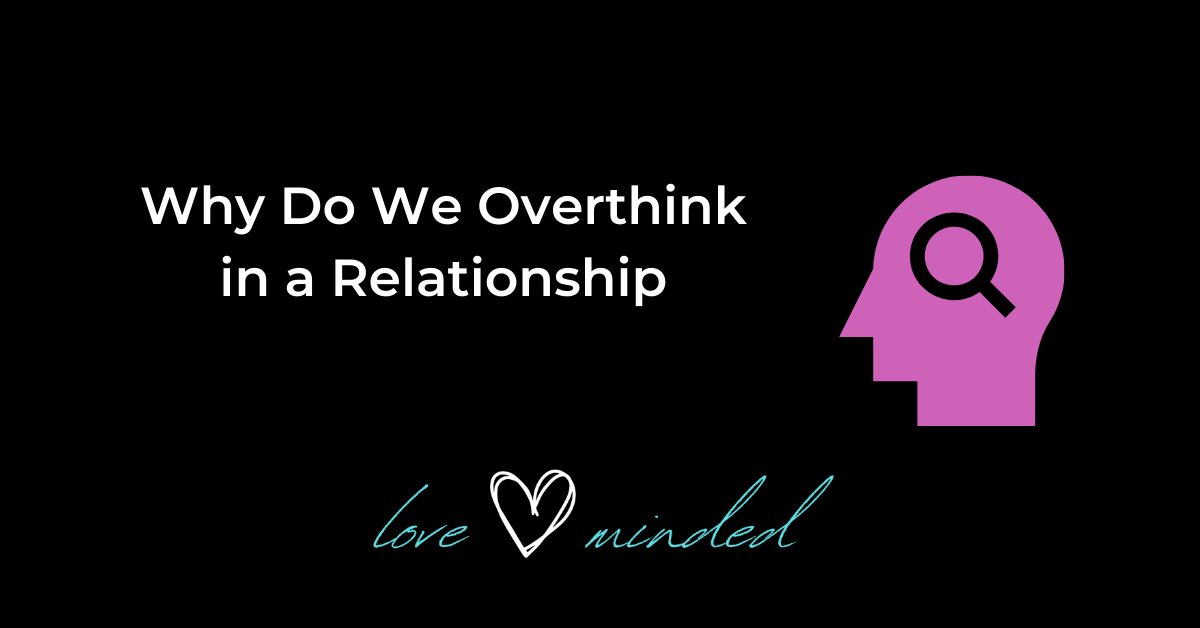
As you read above, the majority of the questions I asked myself were a result of immense insecurity.
I couldn’t let go that maybe I was making the wrong choice, that maybe I was sabotaging my future and ruining my life.
Past experiences had also shown me that I tended to quit things when I got overwhelmed because I couldn’t turn my brain off and just have a quiet mind.
You name it, I’ve tried it and quit it.
Any number of sports, any type of hobby.
Heck, I’ve started almost a dozen blogs that never got past the website design phase because I couldn’t stop feeling insecure about what people might think or say about me.
Overthinking often is driven by our inability to take action for ourselves and give up our freedom, and our dominion over our own lives to other people.
This poison can seep into a relationship and it’s very hard to get it out without focused work, effort, and honesty.
Fear of the unknown is completely natural (unless you’re curious about what’s rustling in the forest late at night).
The future is entirely uncertain. We don’t know what happens next year, next month, next week, or tomorrow.
I have a little secret to tell you: you don’t know how long you have been on this earth.
This might sound morbid, but it’s 100% true.
You could die tomorrow.
Do you want to waste one more second thinking about whether you should post that photo on Instagram, ask that girl or boy out on a date, ask for a raise or a promotion at work, or put a down payment on that condo?
Life goes by faster than you can imagine, and it only goes faster when you get older (I turn 40 next year, so take it from me. Life is on lightspeed for me right now).
Overthinking in a relationship can also be a result of a lack of communication or trust (yes, these two again. They are going to come up a lot in future blog posts, so get used to them).
I mentioned earlier that overthinking itself affects how we communicate and trust, but these two lovely features of a relationship (or the lack thereof) can cause overthinking.
Do you trust your husband with your bank card?
Do you trust our wife with your expensive new air fryer?
Steph doesn’t trust me to do the laundry, but…this is an earned mistrust. Not everything goes in the dryer…yikes!
The fact is, mistrust is toxic and breeds second-guessing and a lack of faith in the person you want to spend the rest of your life with.
Hence, more overthinking and strained communication.
The Negative Effects of Overthinking on Your Relationship
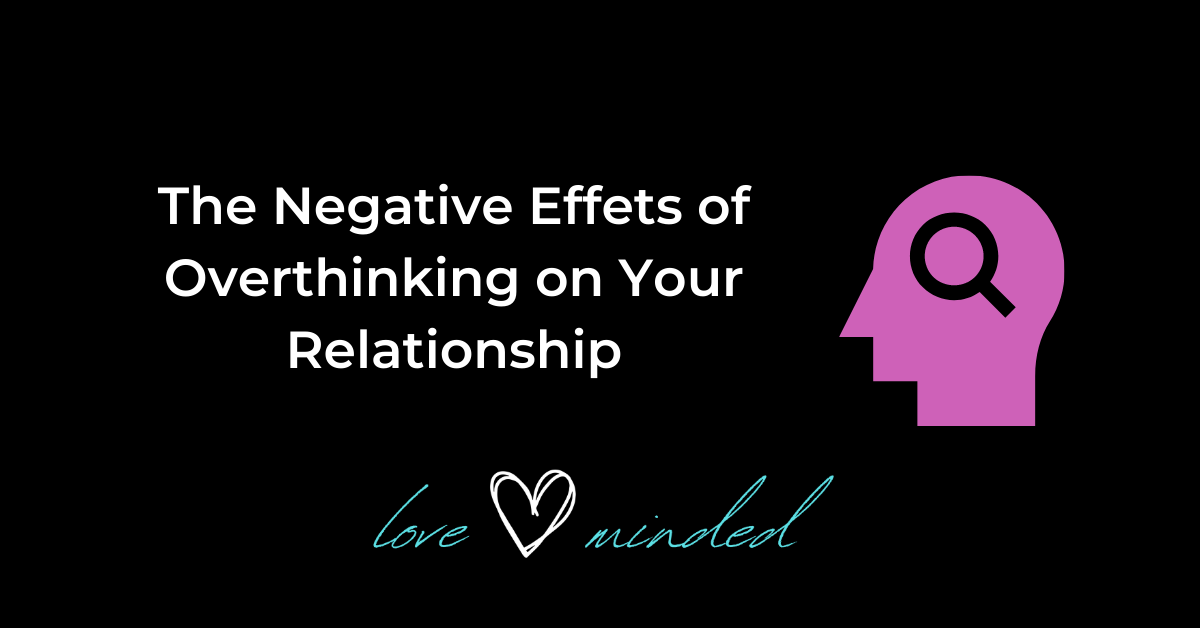
For a year I was obsessed with my future and making a decision I thought would destroy it.
I stopped communicating with my wife as much as I had previously and I didn’t know who to trust.
This jacked my levels of stress and anxiety which, you guessed it, caused more overthinking, more mistrust, and more limited communication from me.
Small things also began to weigh on me.
Things like how a dishwasher is loaded to how high garbage gets pilled under the sink, trivial issues that I would just deal with created immense feelings of a loss of control.
I wouldn’t ever verbalize these things, because I knew inherently the problem was mine.
Instead, I turned inwards and beat myself up for feeling how I felt.
More stress, more anxiety, more overthinking, less communication, less trust.
Do you see how these things can all build?
And I did this for a year.
I felt less connected, more responsible for strain and perceived unhappiness, and less willing to talk about things.
I’m fortunate that Steph is so perceptive because we started talking about these things (thank goodness she prompted it…I don’t know if I had the courage to).
A combined effort meant we were able to break down the issue piece by piece and start going at what my concerns were.
It took me communicating and taking action to discuss this stuff to start progressing forward.
Any licensed professional counselor worth their salt will tell you how important communication is in a relationship.
We’re social creatures, after all, and we thrive on connection. Communication is foundational to that connection and when it’s impacted, the connection frays.
I have an extremely calm, patient, and understanding wife who is stronger and more certain than I am, so I’m lucky and grateful.
Still, if I had been more open from the start, we could have addressed my overthinking earlier and thus, gotten to a resolution earlier.
In the end, I decided not to run again and come the fall once I was no longer an elected official, just a normal private citizen, I started on a new exciting journey.
I work in the best job I’ve ever had, get to travel the world, make more money than I ever have, and am more at peace and connected with Stephanie than ever.
The best part?
I have a greater sense of my self-worth and spent much less time overthinking things and much more time taking action (blog outline planning aside).
It hasn’t been an easy ride and I’ve had lots of different things I’ve tried to get me here.
Following are some of the top strategies I’ve used to develop a quiet mind and stop overthinking.
If you struggle, as I have, try just one of these for a week and see how it works for you.
You might need to try a few things or a combination, but eventually, you’ll find something that can help you slow down, focus, and start making decisions to improve your life and relationship.
11 Ways to Develop a Quiet Mind and Strengthen Your Relationship
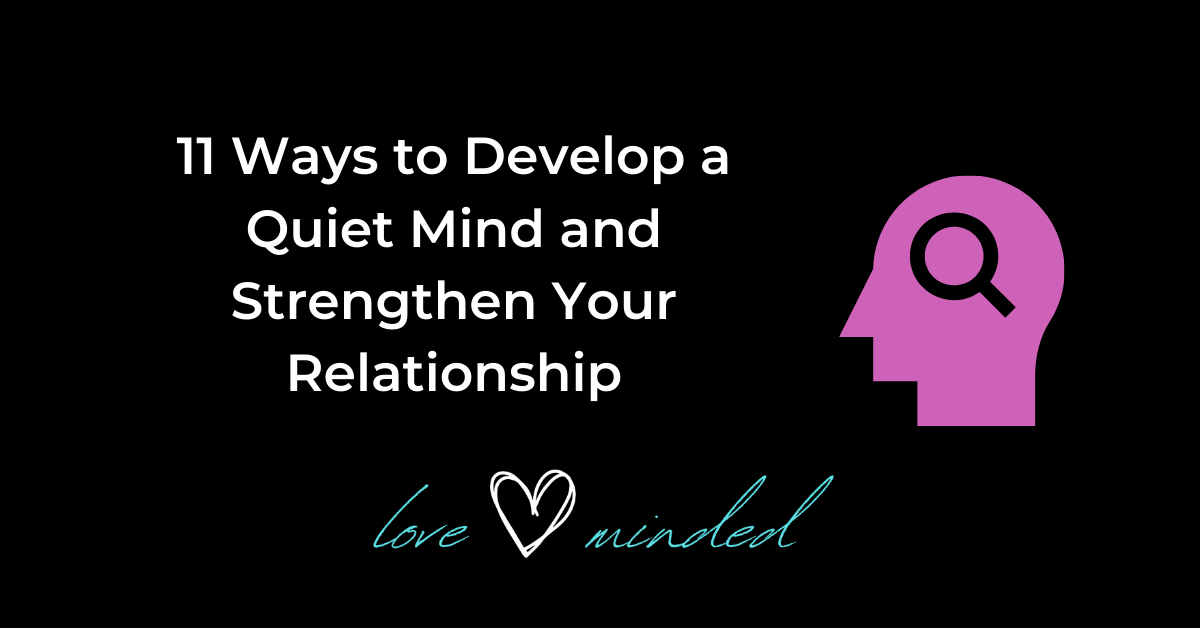
1. Mindfulness for a quiet mind
This is something I do to this very day (albeit, I am working on fitting this in more often).
Mindfulness is the practice of sitting in a comfortable space and working on your breathing.
It sounds strange, but it’s one of the best ways to learn how to live WITH your noisy mind, and it’s done through the simple act of breathing.
By learning how to focus on breathing and being gentle with yourself when distracted, a key concept of mindfulness, you learn to quiet your thoughts by accepting that they are a part of life.
You note the thoughts, but you don’t dwell on them.
You recognize they are there, but you don’t let them take over your life and keep you from the peace that comes from a quiet mind.
You have about 6.5 thoughts per minute and about 6,000 thoughts a day. That’s a lot of opportunities to overthink!
BONUS: Practice mindfulness together. Share thoughts and feelings in a judgement-free space and allow each other opportunities to be in a space together without talking.
By just sitting and breathing together, even for 5 minutes, you’ll find yourself connecting to your partner on a whole new level.
2. Cultivating a Safe and Open Communication Environment
You need to work on establishing ways to openly communicate with your partner free from judgment.
A good way to start is by active listening and practicing responding reflectively.
Too often, we listen TO respond. We can’t wait to get our two cents in and that can leave people feeling ignored, less important, or brushed off.
Instead, listen so you can respond thoughtfully. As you do this, you’ll find yourself thinking less about what you want to say and more about how to engage thoughtfully with your partner.
3. Setting Realistic Expectations for Yourself and Your Partner
Look, nobody is perfect.
If you’re overthinking too much, about your partner or yourself, start by giving that person a break.
Realize we are all dealing with things, all trying to find our way through this life together while facing challenges.
Embrace those things that make yourself and your partner imperfect and acknowledge that there are growth opportunities.
One of the best things about being a couple is that you get to grow on your journey together (as Steph and I have done over the last 19 years).
It’s unlike anything else. You don’t want to spoil that opportunity because you had expectations of yourself or your partner that were unobtainable.
Go easy, breathe, and enjoy the journey.
4. Challenging Negative Thought Patterns
Overthinking follows patterns, so you need to learn to disrupt them.
If you start thinking that you’re not good enough at something, or that some aspect of your relationship is unfixable and it’s your fault, stop those thoughts and challenge them.
Ask them if it’s true and if it is, realistically approach the issue with an open and quiet mind (with your partner) and discuss how to address it.
All of us have biases based on our past experiences and environments. These don’t have to cause spirals of negative thought.
Challenge the thoughts and replace them with positive affirmations.
For example, if you say to yourself that an argument you recently had is going to cause you to break up, challenge the thought by asking yourself if you’re being realistic or just responding emotionally.
If we respond emotionally to negative thoughts that are removed from reality, we’re taking the wrong kind of action that can harm a relationship, maybe irreparably.
5. Reducing Social Media and External Comparisons
This is huge because social media has become such a ubiquitous part of our lives.
If you use social media to compare yourself and your life to others, it’s a breeding ground for overthinking, negativity, and toxic self-image.
Remind yourself that in almost all cases social media portrays are carefully curated to portray the most positive aspects of people’s lives.
Filters are applied. A specific photo is selected at just the right angle. Touchups are made and unwanted objects might be cropped out.
Most of it is fake.
Focus instead on what you bring to this world, to your life, and your relationship.
Undoubtedly, you have something amazing to celebrate every day.
6. Establishing Healthy Boundaries
You will never be able to stop overthinking and have a quiet mind if you don’t set firm and healthy boundaries in your relationship, and also have healthy boundaries set for you.
Steph knows that I have issues with anxiety and I communicate very openly (more than I used to) about how things impact me.
For example, as many couples do, we poke, wrestle, and tease each other. This is fun for both of us. I’m a sensitive guy and depending on my level of anxiety, I can either effortlessly deal with teasing, or it can make me crumble without any warning.
Steph knows this and knows immediately when to reel it in and give me what I need when that happens (typically a hug followed by letting me know how much she loves me and how good and strong I am).
It’s important to know our partner’s needs and preferences so we can understand how to engage with them fairly and respectfully.
As you grow together, you also need to reassess those boundaries.
Since going into therapy, getting on proper medication, and working on myself more, my tolerance for teasing has significantly increased (as has my ability to respond and be witty, something I always feel I’ve struggled with).
I’ve let Steph know this and we work on seeing how far these boundaries have stretched
This is healthy, as long as it’s discussed and accompanied by communication and a mutual assessment of outcomes.
7. Engaging in Self-Care and Individual Hobbies
I cannot say it enough times: self-care needs to come first in any relationship.
As Ru-Paul says “If you don’t love yourself, how the hell are you going to love anybody else.”
He’s right, too.
Overthinking, fear, anxiety, worry, and a noisy brain all thrive off of low self-esteem.
If you don’t think you’re worthy of love, affection, appreciation, and all the good things life has to offer, you will reflect those feelings outward and use them against your loved ones.
It’s just a matter of time.
If you start by learning how to love yourself, you can love those around you more effectively.
This is because you’ve built up a strong sense of who you are, and what your wants, needs, and boundaries are, and can communicate those to your partner.
You cannot have a strong, long-lasting, trustful, and committed relationship if you do not love yourself and take care of yourself first.
This also means finding things that you enjoy apart from your partner.
This is a MUST to work towards a practice of a quiet mind.
Find something that you can throw yourself into and ultimately find yourself in.
For example, Steph loves to garden.
We have the most beautiful front and back garden that she’s spent years cultivating. She’s brought this inside the house and has even expanded it to her work office (and three of her colleagues’ offices as well).
This is important for her. It’s how she decompresses and gets to experience something peaceful and just for her.
Find something, anything, and immerse yourself in it. As a bonus, you’ll find that you have more interesting things to talk about from your experiences that you can share, growing your bond and your connection with your partner.
8. Focusing on Collaborative Problem-Solving
No challenges are solved in isolation when you are a couple, so focus on collaborative problem-solving.
This all goes back to communication (see, I told you this would come up a lot).
If you’re having issues, talk about them. Be honest, but don’t seek to hurt or to score points.
An intimate relationship is not chess or checkers. They are a two-legged race; you run them as a team.
Seek to understand, to be understood without condemnation, or contempt, which is a relationship killer.
If you’re struggling, seek professional help. If you have a job that offers employee assistance as part of extended benefits, see if you can get you and your partner in.
A professional is great at looking at things from the outside. They won’t (and shouldn’t) take sides, but will help you to hear and be heard.
It’s okay if you can’t go it alone.
In fact, it’s an incredibly easy thing to do, and surprisingly, many don’t seek professional help.
Only 19% of couples seek couples therapy, while evidence shows that it works for 70% of patients.
That’s too good NOT to try.
9. Building and Strengthening Trust in Your Relationship
One of the most important things in a relationship is consistency.
Being reliable and consistent will help you foster trust, or rebuild trust that might have been lost.
This may mean putting your ego aside and admitting you were wrong.
Guys, this is especially hard for us!
We are ego-driven beings and admitting we’ve made a mistake is a real gut check.
Take it from me, when you admit wrongdoing it gives you back your power, rather than taking it away.
You’ve owned up to something you shouldn’t have done and have proven your worth and your integrity to yourself.
So much about a relationship, as I said earlier, is about self-worth and empowerment.
If you’ve done wrong by your partner, admit it. It’s better than harbouring guilt, building up resentment, and leading to something explosive down the line.
Getting it right starts with communication.
10. Embracing the Present Moment
Listen to me: LET GO OF THE PAST!
More importantly, FORGIVE EACH OTHER.
If someone made a mistake and hurt you, get over it!
If you made a mistake and someone else can’t get over it and it’s poisoning you, give them a chance to forgive you and then move on.
That’s right, I’m advising you to move on from your relationship if someone cannot forgive you.
You don’t want to spend the rest of your life with guilt being held over your head, do you?
A relationship involves two people.
Two sets of hearts and two sets of brains.
You cannot force someone to respect yours, but you should respect your partner.
So forgive, and move on.
Savour today, live for the present moment and practice the long-lost art of forgiveness.
SIDE NOTE: Forgiveness doesn’t excuse bad behaviour, but it also doesn’t mean beating your partner with their mistakes. Forgive, expect better, and forget.
Don’t let yourself be mistreated, though. Don’t be a doormat.
You have your red lines. Set them down, and be honest with yourself. If someone crosses your red line and that’s too much for you, forgive them but move on.
Your heart and your brain should end things the right way if that’s how it has to be.
11. Seeking Support from Each Other and Professionals
A relationship takes work, no matter what anyone says (yes, even for Steph and me, as I’ve shown in this blog).
Did you know that the word “love” comes from the Proto-Indo-European word leubh which means “care” or “desire”?
If you love someone, you should care about being open and honest with them about your feelings and challenges.
If you love someone, you should desire openness and understanding and also desire to grow and progress together.
Every challenge is an opportunity to connect on an even deeper level, to learn together, and to grow new shoots off of your relationship tree.
This is the best part of the relationship; developing new levels of trust, companionship, and depth.
Find that desire, that cares for connection, if you’re struggling with doubt, worry, overthinking, and a noisy brain.
That desire will carry you through the hard stuff when you’re able to just sit quietly and look into the eyes of your partner and realize how lucky you are that of the billions of people on the planet, you crossed paths with them.
They are a part of your story, and you are theirs.
Wrap Up
Overthinking can be a killer, not just for an intimate relationship, but for self-confidence and your ability to manage the challenges that come from everyday life.
If you can learn to strengthen and develop a quiet mind, you can learn to focus more on the present and stop worrying about all those things that you have no control over.
There is no quick fix to a lifetime of patterned overthinking in a relationship. You’ve got to work to break from the past and find strategies to combat negative thoughts while working towards the most important answer of your life: what makes you happy?
Be sure to take the time to study what it is you want out of life, and take time to build practices that allow you to discover WHO you are.
Practice giving love without expecting anything more than love in return from your partner.
Whether it’s a daily mindfulness practice, journaling, or with a licensed professional counselor (I do all three), implement something every day into your life that helps you grow as an individual.
With your personal growth and empowerment assured, your relationship can grow stronger as well. It just takes those first few steps to get moving down the right path.

